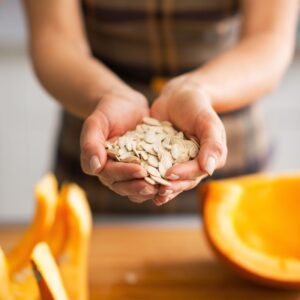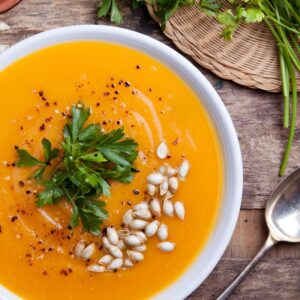 Pumpkin: A Superfood for All Seasons — Pumpkin is not only a delicious and festive fruit, but also a superfood that offers many health benefits. Whether you enjoy it in pies, soups, lattes, or roasted seeds, pumpkin can provide you with essential nutrients that support your vision, heart, immunity, bones, and weight management. In this blog post, we will explore some of the amazing benefits of pumpkin and how you can incorporate more of this nutritious and versatile fruit into your diet.
Pumpkin: A Superfood for All Seasons — Pumpkin is not only a delicious and festive fruit, but also a superfood that offers many health benefits. Whether you enjoy it in pies, soups, lattes, or roasted seeds, pumpkin can provide you with essential nutrients that support your vision, heart, immunity, bones, and weight management. In this blog post, we will explore some of the amazing benefits of pumpkin and how you can incorporate more of this nutritious and versatile fruit into your diet.
Eye and skin health and immune function
 Pumpkin is rich in vitamin A, which is important for eye health, immune function, and skin health. One cup of cooked pumpkin provides 245% of the daily value for vitamin A.
Pumpkin is rich in vitamin A, which is important for eye health, immune function, and skin health. One cup of cooked pumpkin provides 245% of the daily value for vitamin A.
Pumpkin is also a good source of vitamin C, which can help boost your immune system, protect your cells from damage, and support wound healing. One cup of cooked pumpkin provides 19% of the daily value of vitamin C.
Pumpkin: A Superfood for All Seasons
Antioxidants
Pumpkin contains antioxidants, such as beta-carotene, alpha-carotene, and beta-cryptoxanthin, that can help prevent chronic diseases, such as cancer, heart disease, and diabetes. These antioxidants also protect your skin from sun damage and aging.
Pumpkin is high in fiber, which can help improve your digestion, lower your cholesterol, and control your blood sugar. One cup of cooked pumpkin provides 11% of the daily value for fiber.
Fiber and blood pressure
Pumpkin is low in calories, but filling and satisfying. One cup of cooked pumpkin has only 49 calories, but 3 grams of fiber and 2 grams of protein. This makes pumpkin a great food for weight management and appetite control. It’s a good source of potassium, which can help lower your blood pressure, regulate your fluid balance, and support your muscle and nerve function. In fact, one cup of cooked pumpkin provides 16% of the daily value for potassium.
Pumpkin also contains other minerals, such as phosphorus, copper, manganese, iron, magnesium, and zinc, that are essential for various bodily functions and processes.
 As you can see, pumpkin is a superfood that can benefit your health in many ways. You can enjoy pumpkin in various forms, such as fresh or canned purée, roasted seeds, or baked goods. Just be careful to avoid added sugar or fat that may reduce the nutritional value of pumpkin. You can also use pumpkin as an ingredient in soups, salads, smoothies, or even desserts. Pumpkin is a versatile and delicious food that you can enjoy all year round.
As you can see, pumpkin is a superfood that can benefit your health in many ways. You can enjoy pumpkin in various forms, such as fresh or canned purée, roasted seeds, or baked goods. Just be careful to avoid added sugar or fat that may reduce the nutritional value of pumpkin. You can also use pumpkin as an ingredient in soups, salads, smoothies, or even desserts. Pumpkin is a versatile and delicious food that you can enjoy all year round.
Dive deeper into pumpkin nutrition from the Department of Agriculture.
Learn how PPMA’s nutrition program can benefit your health.



